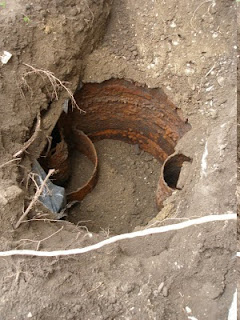
There was a fringe hit on mid-80s FM radio that had, for me, a virulently infectious opening:
I don't wanna face
The day
The day
Today
The singer sounded like a badly hungover, pre-morning-cigarette Mark Knopfler, and for the past quarter-century whenever I've woken up to an unpleasant scene, that's what I'd sing before hitching up my pants and getting on with it. Couldn't tell you who sung it originally, though.
Last month, as the Gulf of Mexico took on Chernobyl-like proportions, I determined to warm up Google and give my memory cells a kick. “Face The Day” was sung by an Australian band called The Angels (fronted by Doc Neeson, whose vocal stylings suggested Tom Petty channeling his self-pity into psychotic aggression), known to North Americans as Angel City. After a little more scrounging I reluctantly headed over to That Repository of Legally Sold Media Files. The real surprise came when I played the song-clips on offer: The Angels were anything but one-hit wonders. There were a half-dozen songs that immediately refreshed themselves in my memory — songs that I'd completely dug, back in the day. I hit “Buy Album,” figuring the odds were good I'd like the unheard material, too.
I do. Wasted Sleepless Nights (A) is currently the most-played album in my collection. The songs on Wasted Sleepless Nights are structured on a solid four-four hard-rock ("chk-chk chk-chk") groove. The lyrics tend to be stream-of-consciousness riffs, low on decipherable content but plenty high on snarling attitude. The later tracks are the ones that sound the most dated: the re-hash of “We've Gotta Get Out Of This Place” is bloated with Frankie Goes To Hollywood synth-horns, and “Back Street Pick Up” is pointedly injected with (again) a synthesizer track pulled directly from ZZ Top's Eliminator. The early stuff, however, flat-out rocks: it's all infectious, but “Take A Long Line” “I Ain't The One” and “Marseilles” are absolute show-stoppers.
According to the Wiki and their own website, The Angels formed in the late 70s, and spent the 80s and 90s touring the world and opening for absolutely everyone. Outside Australia, however, The Angels garnered little more than a few FM radio hits. God only knows why these guys didn't become huge but I'm grateful for it — for entirely selfish reasons, of course. Unlike the many acts they opened for, the Angels' music hasn't worn out its welcome with media over-saturation. Wasted Sleepless Nights stands a very good chance of being this year's Dirty Diamonds.









